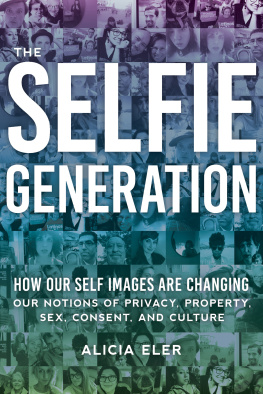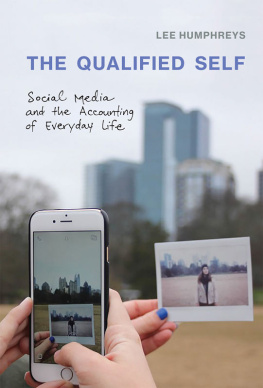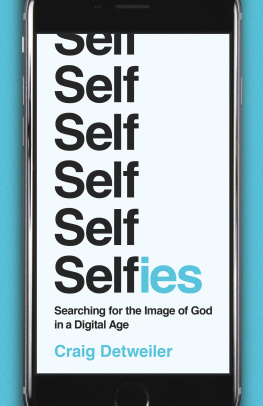


Copyright 2017 by Alicia Eler
All rights reserved. No part of this book may be reproduced in any manner without the express written consent of the publisher, except in the case of brief excerpts in critical reviews or articles. All inquiries should be addressed to Skyhorse Publishing, 307 West 36th Street, 11th Floor, New York, NY 10018.
Skyhorse Publishing books may be purchased in bulk at special discounts for sales promotion, corporate gifts, fund-raising, or educational purposes. Special editions can also be created to specifications. For details, contact the Special Sales Department, Skyhorse Publishing, 307 West 36th Street, 11th Floor, New York, NY 10018 or .
Skyhorse and Skyhorse Publishing are registered trademarks of Skyhorse Publishing, Inc., a Delaware corporation.
Visit our website at www.skyhorsepublishing.com.
10 9 8 7 6 5 4 3 2 1
Library of Congress Cataloging-in-Publication Data is available on file.
Cover design by Erin Seaward-Hiatt
Front cover selfies courtesy of: Emma (), Betty Aloysius Bamford Cassidy, Ray Anthony Barrett, Janna Avner, Marilyn Bamford, Maria Bamford and Scott Marvel Cassidy, JB Brager, Gaby Cepeda, Ihsan Eler, Alicia Eler and Jerry Saltz, Lauren Elizabeth Neal, Priscilla Frank, Nikita Gale, Andrea Gyorody, Peregrine Honig, Alex Huntsberger, Rebecca Kling, Che Landon, Bronwyn Lundberg, Hannah Miet, Maggie Miller, Shera Morgan, Anne Orchier, Eve Peyser, Munib Raad, Brannon Rockwell-Charland, Elaine Romero and Brad Eggers, Dorothy Santos, Sarah Seidelman Bamford, Tiffany Sum, Mark Tilsen, Ben Valentine, Hrag Vartanian, David Wellman and friends campaigning with Hillary for America, Lauren White, An Xiao Mina, Jenny Yurshansky, Sarah Zucker
Print ISBN: 978-1-5107-2264-4
Ebook ISBN: 978-1-5107-2266-8
Printed in the United States of America
For my cousin Sinan Eler, whose selfies will always be remembered.

Sinan pictured with his mother, my aunt Hulya Eler.
An Introduction to the Selfieverse

S ELFIE . T HE SINGULAR MENTION OF that word elicits an opinion from anyone and everyone. The selfie is contentious and controversial because its boundaries arent known yet. In the age of social media, the very existence of the selfie has raised questions about how much of peoples lives should be shared on the Internet and social media. While the desire to connect with others is natural, how much is too much (#overshare) and what does that say about this cultural moment?
This is not an idealistic book about social media and technology. But its also not meant to alarm you. Its a story of necessity and social rewards, of complacency and complexity. Its a story about what happens when you join a social network because you want to connect (#connect).
Ive combined memoir and analysis in this book. It feels necessary to talk about my own selfie-ing experiences in the context of the selfie as an image-object that is also a noun, verb, form, action, aesthetic, and an embodiment of surveillance culture, adolescence, and celebrity.
Originally when I started writing this book, I had three main questions in mind: How has the rise of social media changed notions of online privacy? Why do people selfie? How has social media created hyperpersonalized advertising based on the information we feed the network? I was also interested in how social media was portrayed in TV and pop culture, since so many Americans are influenced by these media images.
Plus, I wanted to explore how representations of the selfie and social media on TV shape popular notions about the right way to selfie. The jury is out on that, though its clear that someone who sits around constantly posting selfies will inevitably be labeled narcissistic. To bring all of these questions together under the umbrella of selfie as a teen/celebrity phenomenon and understand how the selfie came to be what it is today is, ultimately, the goal of this book.
Oh hey, what exactly constitutes a selfie tho?
The word selfie can mean both an action (to selfie) and a form (the selfie). To selfie is a verb: it means to take a selfie. Selfie is a noun: it is an image of your face shot with a front-facing smartphone camera. In the selfieverse, there are two types of selfies we see most frequently.
The recognizable-as-selfie marks itself aesthetically, either through the long arm, duckface, off-kilter gaze, bathroom mirror, #aftersex selfie, survival selfie, #wokeuplikethis in bed from above angle, gym selfie, etc. It is often hashtagged #selfie when shared on social media.
The unrecognizable-as-selfie image attempts to hide or evade its selfie-ness through lack of visual markers. It usually ends up being a close-up of the face.
The selfie is primarily visual, but it can also be textual. A self-referential tweet or status update is a verbal selfie. As Ruth Peyser, my writer colleague/collaborator/friend Eve Peysers mom, once tweeted: A tweet is a verbal selfie.
The very nature of the selfie is that its shot with an awareness of potential publicness even if it is saved to a phone and never shared or leaked. The selfie distorts ideas of public and private, merging the two to create a reality of online existence. This messes with ideas that the private is a privileged space, and that the self offline is the only real self.
Another issue that the selfiein this case, one thats shared to the Internet rather than stored on a phonebrings up is its obviously performative nature (#performativity). Once the selfie is shared, its easily seen by practically anyone online, making it vulnerable to, among other things, facial recognition technologies, which are increasingly troubling for activists working online. Facial recognition technologies on social media and on our phones use those images to identify us, making us easily and simply trackable. In the project Facial Weaponization Suite by artist Zach Blas, he creates collective masks made with aggregated facial data to fight back against biometric facial recognition. This is seemingly opposite of the selfie, which is complicit with and integral to facial recognition technologies and surveillance culture.
The other type of privacy that people bring up when discussing the selfie and social media is Internet privacy and surveillance, which will be the main focus of . The selfie is often thrown into the Internet privacy conversation because it is integral to social media culture and the Internet and fuzzies the line between private and public.
Selfie feelings
I say I never liked taking selfies, but thats simply not true. I love taking and posting selfies where Im feeling good and open to onlookers. But I didnt love the technology that made selfies super ubiquitous, because I first started self-imaging as a teenager with film camera. The times, they are a changin. Or rather, theyve already changed.
But back to the way self-imaging was sped up through technology. The year was 2009, and I was holding out against what everyone around me seemed to imply were requisite technological updates to life. I proudly owned a silver flip phonea.k.a., dumb phoneits cover chipped and worn from me dropping it so often. I was on the family plan, and our data was limited. Two friends of mine had recently purchased iPhones. They both made more money than me, and were admittedly kinda nerdy. The iPhone seemed like something for them, not me.
Next page















